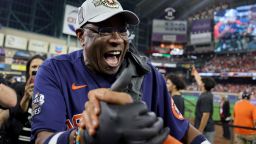Editor’s Note: Bill Carter, a media analyst for CNN, covered the television industry for The New York Times for 25 years. He has written four books on TV, including “The Late Shift: Letterman, Leno, and the Network Battle for the Night” and “The War for Late Night: When Leno Went Early and Television Went Crazy.” The views expressed in this commentary are his own. Read more opinion on CNN.
In the 1970s, when I was still in school, I decided to risk exactly $1 on a lottery ticket. When the numbers were drawn, I checked them on a big outdoor board and found, to my surprise, that I had four of them on my measly single ticket. I’d won 400 bucks!
“This thing will never work,” I concluded. “It’s much too easy to win.”

The big prize, I believe, was $1 million. Flash forward to this week’s Powerball drawing – more than $2 billion. That’s not inflation. That’s insane-flation.
When the Powerball winning total exceeded $1 billion last week, my wife and I agreed we had to buy some tickets. Why? We didn’t normally buy lottery tickets, having long concluded that it felt like burning a $10 bill (sometimes a $20 bill) on a barbecue grill.
But sometimes, when the prize got big enough, we just felt we had to get in the game – even though that 400-buck windfall is my only significant lottery win to date. We managed a few random numbers that added up to an $8 win (really a $12 deficit when including the $20 we spent on the tickets).
But hey, nobody won! And the prize climbed up close to $2 billion, so we invested another $20 – plus our 8-buck winnings from last week.
How could we not? Think of what we could do with all that money!
Really: What would we do with all that money? After helping the kids, donating to charities, buying several homes, etc., what else? Build a “money bin” and swim around in it like Scrooge McDuck? (Unwise. Money can make you liquid, but it is not, in fact, liquid.)
What’s interesting is how many people, like us, ignore lotteries until they soar to staggering amounts. Even a $100 million prize now barely raises eyebrows. As though that’s too piddling to care? Wouldn’t $100 million change most people’s lives forever?
It would mine. But I don’t buy tickets at that level. I only get the bug at about half a bill, but two bill? Ok, you really have my attention.
What is that about? It’s such an old impulse it’s in Greek mythology. Midas was a hit with the god Dionysus, and so was granted a wish. What did he want? Of course, instant wealth. He asked that everything he touched turn to gold.
It didn’t work out when he went to have his dinner.
It’s the same in every story about a genie. Rub the lamp, get three wishes. People always go for the gold, right off the bat (then maybe some colossal form of revenge).
Instant wealth. It’s the stuff American dreams are made of. Back in the early TV days, CBS had a fictional show called “The Millionaire” about some made-up, filthy rich dude whom you never saw (but who was voiced by the guy who did Boris in the “Rocky and Bullwinkle” cartoons). He liked to toy with average Joes/Janes by “giving” them $1 million, tax-free, and then seeing how it messed with their lives. It was all fake, but it showed some recipients finding joy, and others being ruined by it. But nobody said no, though one recipient did give the money back – it was fiction, after all.
Most people likely concluded that if this happened in real life, it wouldn’t be worth being jealous of these lucky overnight millionaires because – unlike us – they’d foul it up somehow. But the show was a hit. People loved the vicarious experience. They also identified with TV sad sacks like Ralph Kramden on “The Honeymooners,” who had a raft of get-rich-quick schemes that always blew up in his face.
Get our free weekly newsletter
- Sign up for CNN Opinion’s newsletter.
- Join us on Twitter and Facebook
Pretty much anything that has seemed like an express ticket to riches has had “hit” written all over it, from “Who Wants to Be a Millionaire?” (answer trivia questions and get a seven-figure check) to “The Beverly Hillbillies” (rubes drenched in oil money who think a swimming pool is a “cee-ment pond”).
In those cases, it didn’t take billions to engage people’s mercenary impulses. But in an era when college kids invent disruptive apps and become billionaires in the blink of an eye, the idea of what constitutes wealth has undergone some serious redefinition – upward.
What hasn’t changed is the human hunger for instant wealth. Buying a Powerball ticket for a shot at a billion dollars is now part of the tradition, pretty much the same thing as trying to capture a leprechaun for his pot of gold – and almost exactly as likely to happen.





